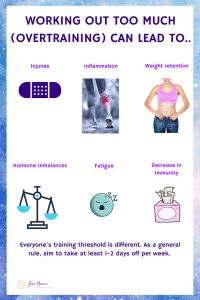5 Ways Overexercising Can Make You Fat & What To Do About It
Whether you want to maintain your health or reach your fitness goals - chances are you are well aware of the many benefits of exercise.You've probably heard that exercise can..
- Improve your mood
- Increase longevity
- Increase your energy level
- Improve cognitive function
- Protect your bones
And the list goes on...While we are constantly bombarded with messages about how exercise is GREAT for us - very seldom do we hear that too much exercise can actually be detrimental to our health (& our waistline!).It seems like we live in an age where we think more is better - more time, more intensity more pushing ourselves to the limit.But the truth is - this mentality can have a truly adverse effect, and there is such a thing as overtraining and TOO MUCH exercise.
Exercise is a form of stress. Period.
Before we get to the reasons why exercise can be hindering your health & results - it's important to state that even though many of us believe exercise is a stress reliever - for the most part exercise is actually a STRESSFUL activity for the body.The exceptions to this are walking and yoga - both of which have been proven time and time again to reduce stress and support the body- however in my personal opinion too much of ANYTHING is not ideal - again all things in balance.Anyways - let me give you an example - despite what runners might tell you about the fact that their run is a source of stress relief - to the body it's a little bit different.The truth is that our bodies don't understand the difference between running on the treadmill and running from a bear. Running sends off a cascade of events throughout the body where certain stress hormones (i.e. cortisol) are released. Cortisol is a stress hormone which in normal amounts is perfectly normal and healthy (in fact we have a normal cortisol pattern that starts high in the AM and decreases as the day goes on), however if the body is forced to crank out tons of cortisol - it can lead to fatigue, fat storage - especially in the midsection - a compromised immune system, hormone imbalances etc. Cortisol is a catabolic hormone meaning that it breaks the body down - again when the body is balanced it has a normal cortisol pattern - but too much of it quite literally breaks the body down.Case in point - I can't even tell you how many clients I've had who have been runners but have claimed to have stubborn fat around their midsection - we can thank cortisol for that!Now I am NOT trying to say that running is bad - or that you need to give up your favorite exercise - rather I want to explain to you WHY there is a sweet spot when it comes to exercise and it's important to keep all things in balance!Even too much of other workout modalities like weight training/metabolic conditioning can be prohibiting you from losing fat.Again - this comes down to the stress response in the body.You see - we have a gland in our brain called the Hypothalamus - the Hypothalamus in quite literally the CEO of our body. The Hypothalamus is constantly assessing our internal and external environment and sending signals throughout the body to increase/decrease hormones, hunger, thirst, sleep, mode, sex drive etc. The hypothalamus is quite literally trying to sense how stressed we are and if we need to be in survival mode or not.You see - if the body senses too much stress (aka it's in a constant sympathetic state or fight or flight mode) it will start to slow down systems that are not pertinent to our survival (i.e. reproduction, immune, digestion). After all - in the body's view - we don't need to be digesting our food if we need to escape from a bear. And we most certainly don't need to be losing fat if we are overly stressed - in fact the body will HOARD fat when it senses too much stress.Wondering how/why exercise might be keeping you from reaching your goals and feeling your best? Let's get to it!
#1 Exercise increases hunger
Our bodies are always trying to maintain a state of homeostasis and when we exercise - we burn calories, which causes our metabolism to speed up, and then we experience hunger.If not kept in check, many people often find that the are overcompensate the amount of calories they are eating - meaning that they cancel out any true caloric burn from the exercise. In fact some people can end up GAINING unwanted weight all because their hunger was drastically increased by hunger.While it's true that exercise can actually decrease immediate hunger - for example you might not be hungry right after you go for a run - you will likely find yourself hungrier several hours later. Overtime this can lead to stalls in weight loss or even worse -unwanted weight gain. Think about it - how many times have you had a big treat meal because you felt like you "earned" it from working out? It's not to say that you can't indulge here and there - but more often than not people use the fact that they work out so much as an excuse to eat more than they truly need.
#2 Overexercising can compromise the immune system
As mentioned earlier - if the body is in a constant "fight or flight" mode - because of too much exercise - it will slow down or decrease certain systems in the body in order to deal with the stress at hand and the immune system can be one of the systems that gets compromised.This can lead to the inability to not be able to not effectively fight off colds, flus etc - or feeling like you are chronically sick ! I want to point out that there are studies that show that exercise can actually BOOST your immune system - and this is very true -BUT too much exercise can absolutely have the adverse effect.
#3 Overexercising can cause hormone imbalances
Remember how we talked about the hypothalamus earlier? Well the hypothalamus signals other glands in the body to excrete (or not excrete) certain hormones. If the body is constantly in a state of stress from overexercising - the chance of hormones becoming imbalanced increases. This can mean experiencing symptoms like loss of libido, thinning (or loss) of hair, loss of menstrual cycle or even thyroid conditions like hypothyroidism.
#4 Overexercising can lead to injury & inability to grow lean muscle tissue
If you are not giving your body a chance to REST and recover - it's safe to say that you could be setting yourself up for future injuries. You see when you exercise you create tiny tears in your muscle tissue - if you do not give your muscles a chance to recover or heal you are increasing your risk of injury.Additionally - when your body is able to repair the tiny tears that are created in the muscle - the muscle grows stronger and becomes more defined & shapely as lean muscle tissue is created. If you are not giving your muscles the chance to repair themselves - they will not be able to effectively repair and grow stronger (and also give you that lean toned look!).
#5 Overexercising can cause the body to hoard fat
Earlier in the post I talked about how overexercising causes a stress cascade response in the body - when the body is in a chronically stressed state it goes into survival mode. And - when your body is in survival mode - you can be pretty damn sure that one of it's LAST priorities is going to be shedding fat.In actuality - the body is more prone to STORE fat when it's experiencing chronic stress. Not to mention - overexercising can actually send a signal to the body to start using MUSCLE for fuel while it simultaneously stores fat - a situation that nobody wants.
Signs that you may be overexercising
Wondering if you might be overdoing it? Check out some common signs of overexercising listed below.
- You feel tired A LOT - and not just the 3 pm slump kind of tired - but you actually feel quite fatigued on a consistent basis.
- You DREAD every single workout you have
- You decline a lot of social events to get your workouts in
- You feel guilty if you skip a workout
- You are noticing a decrease in your libido
- You notice your hair is starting to fall out
- You are cold all of the time
- You never really feel "recovered" from your workouts
- You take less than 2 days off from the gym per week (does not include walking)
- You feel like you "need" to do 1+ hours of working out every day
- You are hoarding fat around your abdomen (approx 1 inch below the belly button)
- You feel hungry all the time
- You feel like you are working your BUTT off and not seeing any results
How much working out is optimal?
It's important to note that everyone is different - some people may be OK with more strenuous workouts than other people. But if something feels *off* for you - or things just don't seem quite right - I highly recommend assessing where you're at (and speaking with your doctor or health care professional).As a general rule of thumb - I recommend that most people take at least 2 days off per week (however walking is perfectly fine every day!).For more specific guidelines - check out my general recommendations below. 
It all boils down to stress
It's interesting & important to point out that the whole concept of overexercising is actually more about the amount of perceived STRESS on the body --- that is what is TRULY behind all of the negative effects behind excess exercise. AND think about it - if you are overexercising AND dealing with a stressful job, stressful relationships etc etc - my gosh - you are going to have quite a hard time reaching your goals!!! Stress is really the main thing that can be hindering your results. Need help figuring out the right amount of exercise for YOUR body and YOUR goals? Get in touch with me & book your FREE consultation below!
Need help figuring out the right amount of exercise for YOUR body and YOUR goals? Get in touch with me & book your FREE consultation below!
